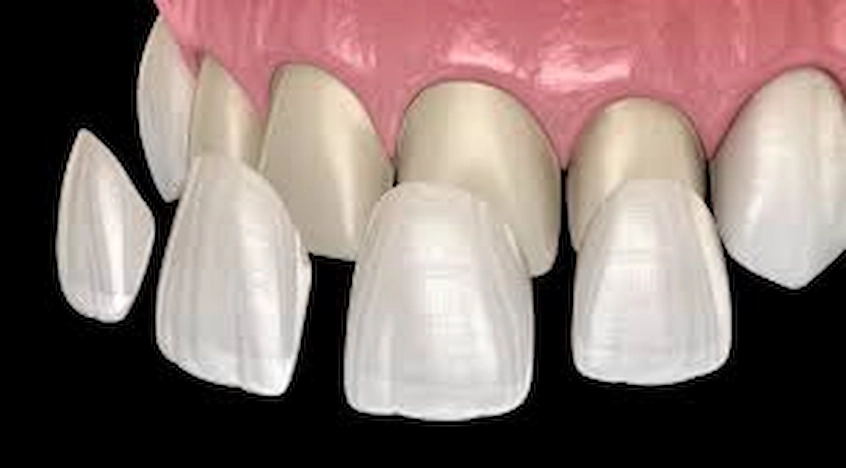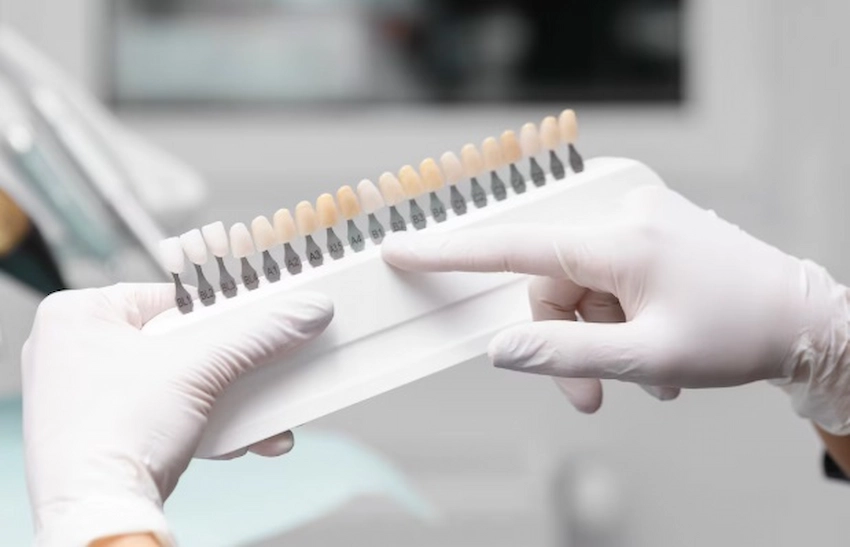🦷Are Veneers Permanent or Just a Temporary Fix?

Appearances matter and today, the desire for an attractive smile is greater than ever for this reason. Because of this, dental veneers have long been the cosmetic procedure of choice for people wishing to improve their smiles by making them bright, radiant, and even.
Nevertheless, many people wonder whether the veneers could be considered a permanent fix to one’s smile or actually temporary and if so, for how long. It is time that this blog brings clarity to the process of installing veneers and the aftercare required for them, as well as the issues concerning the durability of dental veneers, their advantages, and the considerations that should be made when using them.
What Are Veneers and How Do They Work?
Dental veneers, thin yet effective tooth coverings made of porcelain or composite resin, are affixed to the front side of the teeth to restore the natural beauty of a smile. It can likewise conceal all dental problems and disclose any visible imperfections or damages of teeth to deal with discoloration and imperfections. Bridges have lengthy lasting replacements for teeth, have visibly visible parts and shapes, as well as produce a perfect and flawless, natural-looking smile that are molded naturally.
However, before going for the bonding process, minor and specific preparation of your teeth is required.“ This procedure always usually involves removing a small amount of the tooth enamel from the tooth surface to ensure a strong bond between the veneer and your teeth. It helps in creating a good finish of your teeth for the dental veneers or providing a slight reduction for each tooth.
In cases where the dental veneers are almost ready, temporary models that have a similar appearance to the finished ones are used to ensure the fitting of the final product. The dentists form the veneers so that they resemble the look and structure of the right teeth, making temporary ones mostly of a similar nature to the final delivered one. It’s the magic that is discovered by the deformed artistic brilliant and scientists of the dental procedure, which indeed make these people smile again.
For this reason, the people’s teeth need high levels of aesthetic value and restorations, to have the desired look. They wish to be attractive, easy-going, and mouthy and wish to have smiley faces that focus the light on the ‘’ yes ’ and so on. It is generally viewed as one of the most significant improvements in smile re-establishments that is further responsible for the easily generated and developed sense of well-being in people along with the improvement to their self-esteem.
Are Veneers Permanent?
The term “permanent” can be a bit misleading when it comes to dental veneers. Although dentists make use of high-quality materials, the veneers will fail with precision, adaptation, and resistance. Therefore, while bridges can last for a long time, they, in some cases, follow the dates of expiration and have shortcomings such as failure to fit. The usual life span of available dental veneers is 10 to 20 years depending on variations in the interval – it might include many factors such as crowns made of different materials, care of teeth, and habits of service users.
The most durable material that is now available on the market is porcelain, and therefore, when veneer restoration is dental process good in an appropriate way, its estimated lifetime can be around twenty years. However, it is essential to note that while the veneers can’t last for a lifetime, they cannot be routinely replaced but should always be seen as a permanent technique and are truly something that most patients must contemplate prior to beginning this process.
The Lifespan of Veneers: How Long Do They Really Last?

But there is a serious question to ask when it comes to the dental veneers: Why is it so hard to find the specifics of how long do veneers really last?Coming back to the previously mentioned points, the average lifetime of dental veneers is usually between a decade and two, based on some variables.
For example, the porcelain structure of veneers has the highest resistance to wear and tear and staining, and can reach as long as two decades. However, these composite veneers, without the toughest material of porcelain, have a much shorter life cycle and they need to be changed almost every five to seven years.
Nevertheless, it is important to note that one can adopt proper maintenance, take care of oral hygiene, attend regular dental check-ups, and clean teeth, and these can be critical factors that can participate in the preservation and long life of such dental work, regardless of the material used, whereby porcelain and composite veneers are also affected. The need to avoid cracks and chips due to the use of unreasonably excessive power or the teeth being improperly ground, as well as the choice of wise chewing, will help prevent early wear off.
Then, provided that one takes good care of one’s teeth and keeps visiting the dentist for proper check-ups, especially if the required material is porcelain, it is a guarantee that dental veneers would stay long partners with the patients’ beautiful smiles.
Dental veneers are known to be a long-lasting investment when it comes to enhancing the aesthetics of the teeth and correcting minor imperfections. Nevertheless, for them to last as long as possible there are many factors at play that can influence their durability.
As stated here below are some important factors that will determine the longevity of your veneers. By applying these factors and maintaining healthy dental habits, we’ll help increase the life expectancy of your beautiful smile functioned by veneers, beautiful and guaranteed to last.
- Material Quality: If you’re looking for durable options for your smile correction procedure, porcelain veneers are by far among the strongest, the most aesthetically pleasing, and the best option for smile correction. They are known for their tooth-like appearance and high resistance to staining and wear that make them an option of choice as compared to composite resin, which has low resistivity and is not as beautiful. The quality of materials used in making the veneers thus determines how well they will perform overtime and ultimately their lifespan over time.
- Oral Hygiene: To ensure that your porcelain or composite resin veneer lasts for many years to come, it’s important to incorporate regular oral hygiene practices into your daily routine. Just like natural teeth, dental veneers need a proper oral regime that involves brushing (twice a day) and flossing every single day to remove plaque and food particles from getting glued to the surface of your teeth. This can help prevent tooth decay and gum disease, which could damage both actual tooth structures and the edges of veneers. Proper care also includes minimizing smoking and other habits such as coffee consumption which are significant contributors for causing discoloration over time.
- Diet and Habits: Diet plays a huge role in influencing the longevity of your veneers. It is advisable to avoid hard or sticky foods, as they can damage porcelain or composite resin veneers and make them need repairing work.
Understanding the Treatment Process

To be transparent,let’s break down the foundation of dental veneer treatment, the process of veneer applications, and a few important steps that are undertaken even during the modest initial stage of intervention.
- Consultation and Planning: At the beginning of these processes, there is a thorough examination and a real professional is doing it. He or she will check the condition of your mouth and will be totally behind your plans for cosmetic changes.
- Preparation: Sometimes, when the natural structure of the teeth is to be removed to make the placement of the veneers easier, the method can involve the removal of some parts of the tooth enamel.
- Impression: Next, molds of the teeth are going to be taken by the dentist. This process is incredibly crucial because the products will then be tailor-made to your teeth and they will fit the natural look perfectly.
- Bonding: The final step of dental veneer treatment is described as the stage where the veneers are given and put into place. Teeth will be put together by a strong adhesive and the ends will be trimmed properly. The possibility of veneers that are too big or totally another color than one’s natural teeth is eliminated. If small corrections are needed, now is the time to make them.
Post-Treatment Care: How to Maintain Your Veneers
Many people do not know that dental veneers also need to be maintained properly for longer life. Here is a guide on the most effective methods to ensure the long life of your veneers:Oral Hygiene: Footer footers very often involve precautionary actions. Even though veneers are not for the replacement of dentures, they need to be taken care of along with the rest of the mouth. Not just because it is essential to medicate them but also, the use of dental plaque and other infections can be harmful.
FAQ: Common Questions About Veneers
Veneers are thin shells made from porcelain or composite resin that cover the front of teeth to improve their appearance. They are custom-made and bonded to the teeth after a small amount of enamel is removed.
Veneers are a long-lasting solution but are not permanent and will need to be replaced eventually. They typically last between 10 to 20 years depending on care and material type.
Porcelain veneers can last up to 20 years, while composite veneers typically last 5 to 7 years. Proper care and good oral hygiene can extend their lifespan.
The material quality, oral hygiene, diet, and habits like teeth grinding or nail-biting can affect how long veneers last. Regular dental check-ups also help monitor the condition of veneers.
Veneers may not be suitable for individuals with severe gum disease or those who grind their teeth excessively. A dentist can determine if veneers are the best option based on your oral health.
The cost of veneers ranges from $800 to $2,500 per tooth for porcelain veneers and $250 to $1,500 for composite veneers. The price can vary based on the material used, location, and dentist’s expertise.
The veneer application process involves removing a small amount of enamel, taking impressions, creating custom veneers, and bonding them to the teeth. Adjustments are made for a natural fit and look.
Porcelain veneers are resistant to staining, but composite veneers can discolor over time. Proper care, such as avoiding stain-causing foods, can help maintain the veneers’ appearance.
To maintain veneers, brush and floss regularly and avoid stain-causing foods like coffee and red wine. It’s also essential to visit your dentist regularly for check-ups.
Alternatives to veneers include teeth whitening, dental bonding, crowns, and orthodontic treatments. A dentist can recommend the best option based on your specific needs.




